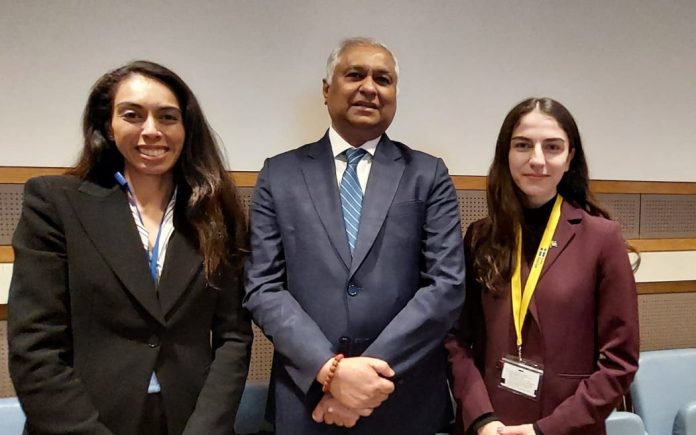Pacific leaders are urging UN member states to finalise a high seas treaty in the next two weeks to protect global marine biodiversity.
Negotiators from around the world convened for the fifth session of the Intergovernmental Conference on Biodiversity Beyond National Jurisdictions (BBNJ) from Monday at the UN headquarters in New York – with the meeting running until 03 March.
Fiji’s UN representative, Ambassador Satyendra Prasad, said nations have less than two weeks to finalise a legally binding treaty that “is of far reaching importance to Pacific islands”.
Prasad said the stakes could not be higher for islands from the Blue Pacific.
“Our stakes as individual countries in this could not be higher and all our negotiators from different member states are assembled here. They will be working 24/7,” he said.
“We will be in many negotiations in rooms and we hope with the international community, countries beyond the Pacific islands, will meet us halfway [to] deliver a far reaching forward, looking treaty that protects the high seas.”
The Pacific Ocean spans over 40 million square miles but only a small part of that is protected through the UN Convention Law of the Sea (UNCLOS) – the most comprehensive mechanism to guide the conservation and use of the oceans.
“[UNCLOS] provides protection for the seas that are 200 miles beyond our last land but the waters beyond them are not protected,” he said.
“BBNJ is the treaty which will provide some protection as well as provide the guidelines for how should we deal with commerce, science and in commercial activities on the high seas. It is of crucial importance.”
He said Pacific Island Forum leaders meeting in Fiji this week will have an eye on the negotiations in New York.
“They [leaders] are urging member states of the world to agree to an ambitious, far reaching, forward-looking treaty that will provide both guidelines and frameworks for commercial activities as well as establish high benchmarks and guidelines for protection of the high seas.”
Palau’s UN representative Ambassador Ilana Seid said “we have to treat the ocean as one ocean.”
“There can’t really be a mechanism for ocean governance that’s just territorial. It is like having a nice house in a bad neighbourhood,” Seid said.
“Without proper governance of a whole ocean, it’s really hard to implement policy and regulations that create a sustainable ocean.”
She said small islands developing states (SIDS) have unique challenges and these also need to be recognised in the treaty.
“We calling for special circumstances for SIDS in the document itself to recognise that small islands are small, they are remote, we don’t have much access to resources but we have a very important voice in terms of ocean issues.
It is expected that once the BBNJ treaty is in place it would mean countries will be able “to come up with sustainable use plans that facilitate financing and investment so that we create a more sustainable ocean plan going forward,” Seid said.
Both Prasad and Seid were speakers at a side event hosted by Fiji and Sweden on how protecting the high seas helps to achieve the UN’s sustainable development goal.
On Monday, Pacific Ocean Commissioner, Henry Puna, also appealed to the international community “to bring the high seas treaty canoe home”.
“The process of negotiating this legally-binding instrument under the UN Convention on the Law of the Sea, UNCLOS, has been challenging and arduous, lasting well over a decade,” Puna said.
“Its adoption will be a momentous occasion for humanity as, together with other agreements, it would represent a ‘whole ocean’ approach, particularly on the conservation and sustainable use of marine biological diversity of areas beyond national jurisdiction,” he added.
SOURCE: RNZ PACIFIC/PACNEWS













